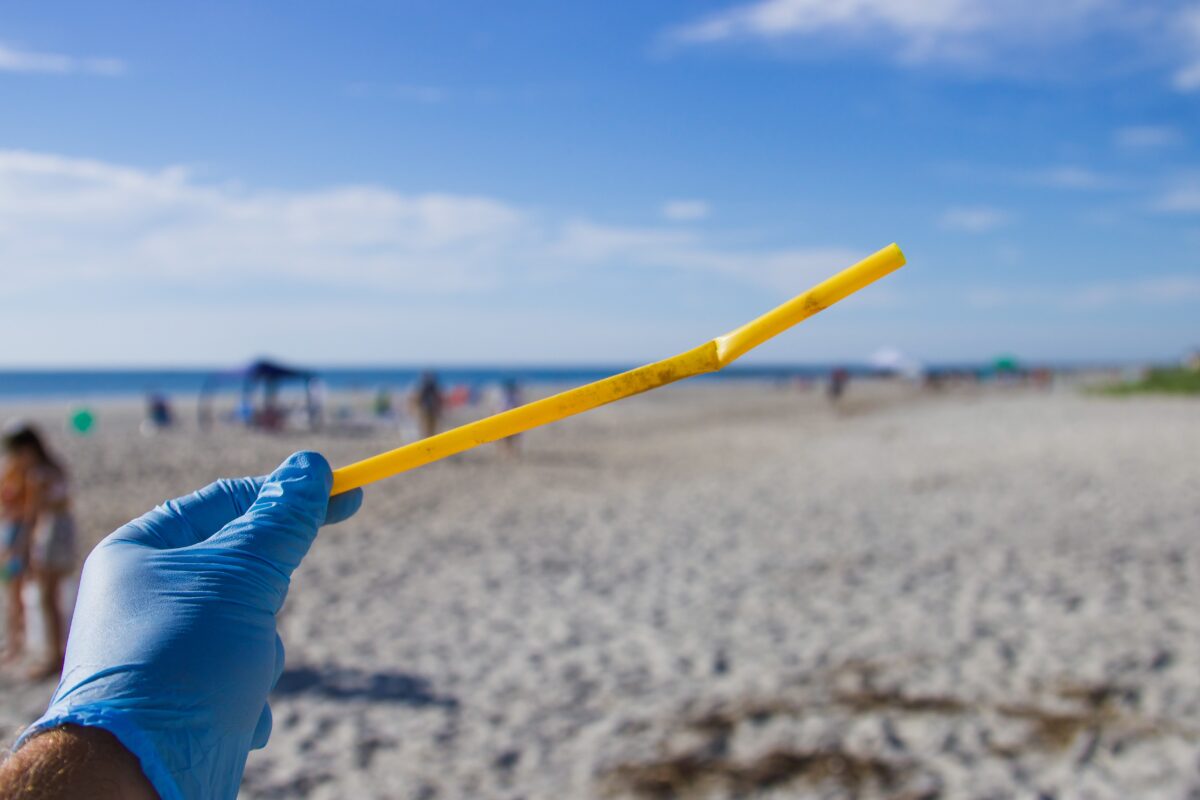In 2015, while conducting field work in the waters of Costa Rica, Texas A&M graduate student Christine Figgener found a male sea turtle with a plastic straw lodged up his nose. Figgener’s team removed the straw in hopes that the turtle would survive. The video of the incident went viral, sparking an international movement to ban the use of plastic straws. Straw bans have already taken shape in cities like Seattle, states like California, countries like the UK, and corporations like Starbucks, Hyatt, Disney, and American Airlines.
As more join the straw ban movement, many important questions remain. Are straws really the issue here? What about people with disabilities for whom straws are a necessity? How is a straw ban enforced? Why a ban instead of a tax? How much will it help the environment, if at all? The answers to these questions are imperative for capitalizing on the surge of public support for plastic reduction and creating equitable, economical, and enforceable policies to ensure that no more sea turtles are injured by straws stuck in their nose and no more marine life die from ingesting microplastics.
In the Ocean Conservancy’s 2017 Coastal Cleanup Report, straws and stirrers were the seventh most common item found washed up on coasts, accounting for 3% of total trash. Plastics, even compostable ones, are not biodegradable (compostable plastics can only be properly decomposed in a composting facility). Over time, plastics decompose into microplastics—carcinogens that have now been ingested by 71% of seabirds and 30% of turtles. Based on current trends, by 2050, the ocean will contain more plastic by weight than fish.
Straws may not be the biggest fish in the sea, but their size presents issues that many other plastics do not face. Unlike other plastics, straws are not recyclable. Since straws are so small, recycling machinery cannot separate straws from other materials. Though the cost of using one more straw may be small and inconsequential, so is the benefit, for most people. Americans alone use upwards of 170 million straws per day, enough to fill about 43 school buses. Even if the cost of using one straw is barely more than the benefit, 170 million per day adds up quick.
Yet, for many people, straws are an absolute necessity. Due to a variety of disabilities, many people require plastic straws to drink liquids, and a world without plastic straws would be fatal. Though many other types of straws have been invented, plastic still remains the only reliable material for people with disabilities that require straws—paper and biodegradable straws can be bitten through by people with limited jaw control, metal straws can get too hot or cold depending on the liquid and can cause sensory issues, and reusable straws can be too difficult to wash, not to mention an extreme inconvenience. In an article for NPR, Lei Wiley-Mydske recounted her experience with autism, saying “Disabled people have to find ways to navigate through the world because they know it was not made for us. If someone says, ‘This does not work for me,’ it’s because they’ve tried everything else.” Wiley-Mydske rises a very important point: no one knows the benefits of a commodity and its viable substitutes as well as the consumer. This conversation remains ongoing, but people with disabilities have spoken out, and many entities have listened to their concerns and enacted policies where plastic straws will be available upon request, no questions asked.
These provisions are absolutely essential, but if anyone can ask for a straw, it’s no longer a ban, it’s a “straw-optional policy.” A straw ban, by definition, makes straws illegal. How then, would violators be punished? If not at all, then what’s the point? If with jail time, then who’s paying for it? If with a fine, why not just legalize, tax, and regulate, like other consumer products with negative externalities like alcohol and tobacco? How would the ban deal with companies like Starbucks, who are phasing out plastic straws and replacing them with a new “sippy cup” style lid that contains more plastic than the original lid and straw combined (the new Starbucks lids are recyclable, but since only 9% of recyclable plastic is actually recycled, the new lid may prove worse than keeping the straws)? Internet memes imagining an “underground straw market” with “straw dealers” who charge extra for the “special bendy ones” have spread the very real point that a ban on straws requires an appropriate enforcement mechanism. Prioritizing availability to people with disabilities who need straws adds even more challenges to enforce it.
One proposed solution to the enforcement issue would be to use a straw tax instead of a straw ban. Though easier to enforce and much more economically efficient, a straw tax is much harder to calculate and make equitable. Taxes on plastic grocery bags have found much success—in Chicago, plastic bag use has dropped 42% and in Ireland, it has dropped 95% (Boston will commence a 5-cent plastic bag tax on December 14, 2018)—but plastic bags have an easy substitute: reusable bags. Implementing a straw tax would require either a monetary quantification of straws’ environmental harm or, more likely, a trial and error period in which the tax gradually rises until straw use decreases sufficiently. With an already insurmountable amount of straws coating our ocean floor, there exists no easy way to calculate a “sufficient” decrease. And for people with disabilities, determining a just method of enforcing the tax and granting exemptions poses another hurdle.
Grappling with all of these concerns may be frustrating and discouraging, but if some equitable, economical, enforceable, holistic policy to reduce plastic straw consumption worked, the results would not go unnoticed. Cleaning 3% of the ocean is a huge start, and many advocating for straw bans hope that they’ll lead to bans or regulations on other environmentally unfriendly consumer products. However, the choice of straws as a “gateway plastic” may have been myopic. In an opinion piece for Eater.com, Alice Wong, a woman from San Francisco who requires straws due to her disability, wrote, “Plastic straws are considered unnecessary items used by environmentalists as a ‘gateway plastic’ to engage the public on a larger conversation about waste. […] But one person’s social prop is another person’s conduit for nutrition.” Kickstarting the international effort to reduce plastic consumption with straws is ambitious—traditional bans and taxes that work well with other single-use plastics are not an easy transfer. Only time will tell if a straw ban will spark an honest reflection on our overuse of single-use plastics or spawn a frustrated public who decides to eat a steak dinner and take an extra long shower to cope with the inconvenience.
To reduce plastic waste, the world has to start somewhere. Is this the right place?
Sources
Brueck, H. (2018, September 21). The real reason why so many cities and businesses are banning plastic straws has nothing to do with straws at all. Retrieved from https://www.businessinsider.com/plastic-straw-ban-why-are-there-so-many-2018-7
Cherone, H., & Wetli, P. (2017, April 24). Chicago’s Plastic Bag Tax Is Working – Big Time, Study Shows. Retrieved from https://www.dnainfo.com/chicago/20170424/lincoln-square/were-using-42-percent-fewer-bags-since-7-cent-tax-started-city-study-says/
Chokshi, N. (2018, July 19). How a 9-Year-Old Boy’s Statistic Shaped a Debate on Straws. Retrieved from https://www.nytimes.com/2018/07/19/business/plastic-straws-ban-fact-check-nyt.html
Corbett, E. (2018, July 11). These 8 Companies Are Ditching Plastic Straws. Here’s How They Are Replacing Them. Retrieved from http://fortune.com/2018/07/11/ditching-plastic-straws-replacements/
Danovich, T., & Godoy, M. (2018, July 11). Why People With Disabilities Want Bans On Plastic Straws To Be More Flexible. Retrieved from https://www.npr.org/sections/thesalt/2018/07/11/627773979/why-people-with-disabilities-want-bans-on-plastic-straws-to-be-more-flexible
Ellen McArthur Foundation. (2016, January 19). New Plastics Economy report offers blueprint to design a circular future for plastics. Retrieved from https://www.ellenmacarthurfoundation.org/news/new-plastics-economy-report-offers-blueprint-to-design-a-circular-future-for-plastics
European Commission. (2017, November 24). Breaking bag habits. Retrieved from https://ec.europa.eu/environment/efe/themes/waste/breaking-bag-habits_en
For a Strawless Ocean. (n.d.). Why This Matters. Retrieved from https://www.strawlessocean.org/faq/
Ocean Conservancy. (2017). International Coastal Cleanup Report(pp. 1-28, Rep.). doi:https://oceanconservancy.org/wp-content/uploads/2017/06/International-Coastal-Cleanup_2017-Report.pdf
Reducing plastic bags in the City of Boston. (2018, October 16). Retrieved from https://www.boston.gov/departments/environment/reducing-plastic-bags-city-boston
Thomsen, J. (2018, April 19). UK to become first country to ban plastic straws. Retrieved from https://thehill.com/policy/energy-environment/383880-uk-to-become-first-country-to-ban-plastic-straws
Viswanathan, R. (2018, July 27). Why Starbucks, Disney, and Tom Brady are all shunning plastic straws. Retrieved from https://www.vox.com/2018/6/25/17488336/starbucks-plastic-straw-ban-ocean-pollution
Wong, A. (2018, July 19). Banning Plastic Straws Is a Huge Burden on Disabled People. Retrieved from https://www.eater.com/2018/7/19/17586742/plastic-straw-ban-disabilities

